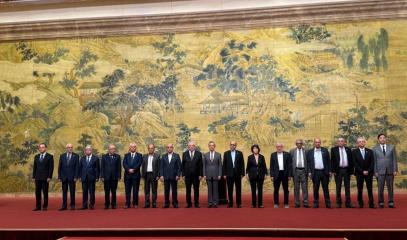Palestinian factions: how firm is the Beijing agreement?
At the end of three days of talks involving Hamas, Fatah and 12 other groups, Chinese Foreign Minister Wang Yi announced today an agreement for an "interim national unity government" in post-war Gaza. But the official Palestinian News Agency makes no mention of this in reporting the deal. Meanwhile, the United States, Israel, and the United Arab Emirates are once again talking to each other about an international mission with a role for the latter in Gaza.
Milan (AsiaNews) – Fourteen Palestinian factions signed an agreement "blessed" by the Foreign Minister of the People's Republic of China, Wang Yi.
At the end of three days of meetings in Beijing, followed by the traditional photo op, an announcement was issued this morning that Hamas, Fatah, and other Palestinian groups had reached an agreement through Chinese mediation on the future of Palestine.
This, however, calls for some caution since similar deals have been struck and failed in the past.
The Hamas delegation in Beijing was led Musa Abu Marzuk, one of the group’s foremost leaders, while Fatah was represented by senior leader Mahmud al-Aloul.
The representatives of Egypt (historic mediator in Gaza), Algeria (which has played a leading role in the UN Security Council in recent months in resolutions dedicated to the conflict), and Russia were also present.
According to the announcement, the agreement includes the establishment of an “interim national reconciliation government” that will also rule Gaza once the war is over.
This result reflects China's ambitions to play a key role in the future balance of power in the Middle East, but with Hamas' involvement that is unlikely to be accepted by Israel.
"Today we signed an agreement for national unity and we say that the path to completing this journey is national unity," said Marzouk.
“Reconciliation is an internal matter for the Palestinian factions, but at the same time, it cannot be achieved without the support of the international community,” Wang said.
The news of the intra-Palestinian agreement comes just as Israeli Prime Minister Benjamin Netanyahu is travelling to Washington. It also precedes by a couple of days, the resumption of talks on a ceasefire and the release of Israeli hostages, one of the stumbling block in Gaza for the "day after".
The Beijing agreement must be seen along with other talks related to the conflict that has been going on for more than nine months in Gaza.
Meanwhile, Axios, a US-based news website, is reporting a secret summit between the United States, Israel, and the United Arab Emirates (UAE) last week.
Earlier, an op-ed in the Financial Times inked by Emirati diplomat Lana Nusseibeh said that a temporary international mission could be deployed in Gaza to meet the humanitarian crisis, restore law and order, and lay the foundations for governance.
The UAE would be prepared to send its troops, but on condition that the international mission acts at the formal invitation of the Palestinian National Authority.
Israeli Prime Minister Netanyahu has always rejected this possibility, but some sources suggest that he might give in under pressure from Washington.
Two very different and opposing scenarios are thus emerging from Beijing and Washington for the post-war period in Gaza.
It is noteworthy to point out that WAFA, the official Palestinian News Agency, reported the Beijing agreement between the Palestinian factions making no mention of who will rule Gaza.
This shows how confused the picture is and how the specific interests of the various mediators in the ongoing war in Gaza complicate the conflict rather than bring the parties closer to a solution.
GATEWAY TO THE EAST IS THE ASIANEWS NEWSLETTER DEDICATED TO THE MIDDLE EAST. WOULD YOU LIKE TO RECEIVE IT EVERY TUESDAY? TO SUBSCRIBE, CLICK HERE.








.png)










